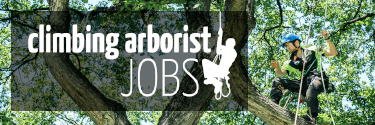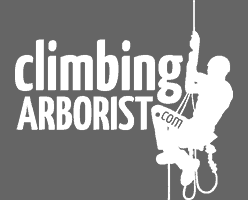Being an Arborist is a wonderful thing. If you love the outdoors, have a great appreciation of nature, love to challenge yourself and work as part of a team then it can be such a rewarding career.
Did you ever climb trees as a child? Most climbing Arborists that you speak to will tell you they loved climbing in trees and playing in treehouse as a kid. I think this stays in our subconscious as a happy place, and if you can convert this into a career then why wouldn’t you.
Having an understanding of why trees grow like they do in both their natural environment and an urban setting, how they respond to damage caused by nature (lightning etc) and man made damage, learning and understanding these things gives you a further appreciation of how amazing trees are and how we can manage them in an urban environment to keep them healthy and safe for the public.
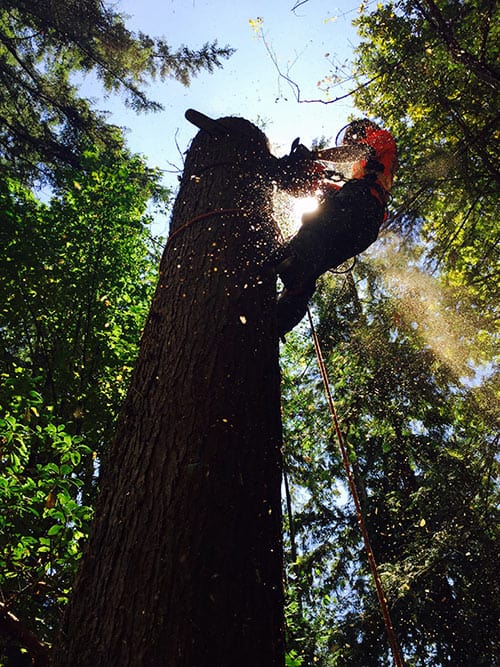 As professional Arborists we cover a wide range practices, depending on the path you take as an arborist and the companies you choose to work for will dictate the type of work that you do and how diverse it may be.
As professional Arborists we cover a wide range practices, depending on the path you take as an arborist and the companies you choose to work for will dictate the type of work that you do and how diverse it may be.
This is a great industry to be in if you want to travel abroad, there is always a demand for good Arborists worldwide. Check out our links to immigration websites under ‘Working abroad’.
There are various avenues that you can go down in order to start your career as an arborist.
One option is you can start at the very bottom of the ladder straight out of school with no prior training or education in the specific field and learn everything on the job (to search for Arb jobs you can use ClimbingArboristJobs.com).
The second option is to find a training body or college that run short courses in tree climbing, e.g 8 week courses, which will then give you an insight into the industry, teach you some basic techniques and a little knowledge on the theory side of things.
The next option would be to find a local college and company that provides an Arboriculture apprenticeship program, this means that you get full exposure to working for a tree care company and learning in a hands on environment from colleagues, with the added benefit of having set weeks within the year to learn from a curriculum on the theoretical side.
Finally you can choose to take a Diploma or a Degree in Arboriculture / Urban Forestry at a college or University, this will teach you in a much more in depth way about how trees grow, what they need from their environment and how they react to situation. You will also learn the practical side of the industry, tree climbing techniques, using chainsaws and wood chippers, you may also learn a little about the business side of things and running you own company. This will prepare you much more for your career in Arboriculture and give you more options straight out of the gate.
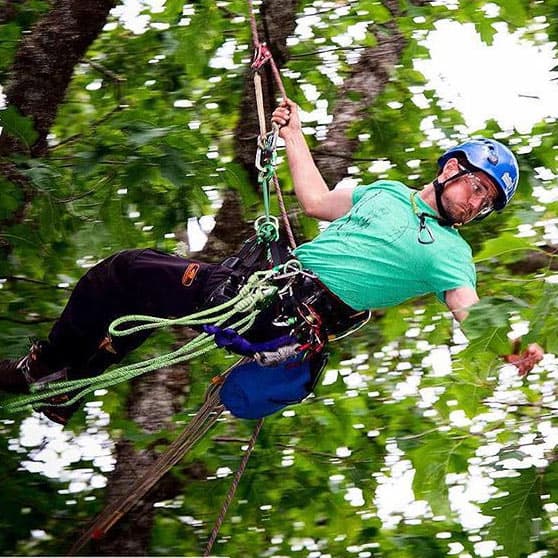

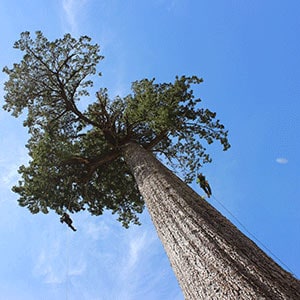
Below is a list of the more common positions you will come across in the tree care industry:
Grounds person - is where the majority of people start out, people coming into the industry with no prior knowledge and those that come from college programmes.
A general job description would be: Working with a crew to help undertake the pruning or removal of trees and shrubs, operating a range of machinery including chainsaws, wood chipper, hedge trimmer, as well as hand tools used for pruning. Assisting in rigging operations by understanding the systems, controlling the rigging ropes and pull lines.
Learning and have an understanding of compartmentalization in trees and correct pruning practices to minimize exposure to decay.
Even if you have had some kind of tree climbing and pruning training, it is the kind of job where there are so many different aspects to learn about safety, machinery, techniques both on the ground and in the canopy, everyone needs to learn through experience.
Climbing Arborist - is a position that the majority of Arborists will do at some point in there career and is the most rewarding. Becoming an efficient climbing arborist definitely takes time, commitment and dedication, also listening and learning from others around you.
This position will vary greatly from day to day. As a climber you will be required to undertake various types of pruning e.g deadwood removal, crown thinning, crown reduction, specific branch weight reduction, crown raising and clearance pruning, you will also perform tree removals of all sizes and degrees of difficulty that could incorporate various rigging systems.
There are also more specialized work specifications such as installing lightning protection in tall and/or important trees, also implementing bracing/supporting systems within the canopy to reduce the reduce of failure.
As a climbing Arborist you may be required to lead the crew if you are the most knowledgable or experienced.
Plant healthcare technician - this position focuses on keeping plants in the urban environment as healthy as possible due to most trees and shrubs having poor environments in comparison to their natural habitat.
Plant health care technicians will need to have a good plant identification, a knowledge of soils science as well as an understanding of pests and diseases in their part of the world. This knowledge will then help them to diagnose tree and shrubs issues and help put together a program to deals with these issues through various means e.g. Fertilization, root invigoration, pesticide application, identifying problems such as girdling roots.
Arborist Representative - this is often a position that those working on the tools will move into as their career progresses and they move into a less physically demanding role.
An Arborist Rep jobs is to meet with the companies clients whether that be residential or commercial and listen to their tree care needs, or make provide professional advice and come up with suggestions and maybe tree care management plans. This position is about having both a great arboricultural knowledge and knowledge of the practical side (e.g how the jobs are undertaken), as well as having good communication and people skills.
Tree consultant - this position is much less practical and far more theory based. As a tree consultant you would be called out to inspect certain trees at the request of you clients for various reasons e.g. their own personal worry, insurance companies, pre development/construction. It is the consultants job to go through all aspects of the environment and the tree itself to ascertain the tree’s health and if it poses a potential risk, and if so, how high of a risk. From there the consultant will recommend any work based on their results.

